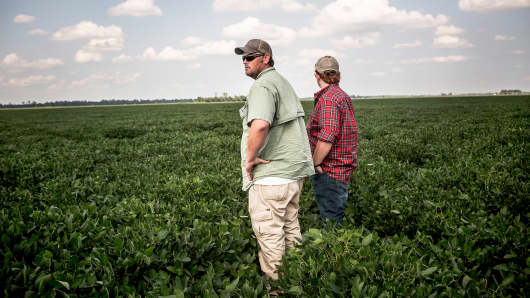CNBC – Politics
Depression-era program could help farmers in trade war but still won’t make them ‘whole,’ says former USDA secretary
A Depression-era program could help farmers in the trade war with China, according to Dan Glickman, who served as agriculture secretary in the Clinton administration.
Glickman said other options also could be used within the agriculture agency but still won’t make farmers “whole.”
On Friday, China announced tariffs on $34 billion worth of American products, including soybeans, corn, wheat, beef, dairy products and sorghum.
Jeff Daniels June 15, 2018
 Getty Images. Soybean farmers in Mississippi County, Arkansas.
Getty Images. Soybean farmers in Mississippi County, Arkansas.
Although President Donald Trump has offered to make it up to farmers in a trade war, there’s no way to fully cushion all the potential losses that producers could suffer if there’s a significant reduction in soybeans and other exports, according to a former agriculture secretary.
On Friday, China announced a 25 percent tariff on $34 billion worth of American products, including soybeans, corn, wheat, beef, dairy products and sorghum. It followed the White House earlier in the day announcing plans to impose tariffs on more than 800 Chinese imports worth approximately $34 billion.
Earlier this year, Trump spoke about escalating trade tensions with China and said his administration essentially had the backs of farmers and would “make it up to them” and that in the end they “will be better off than they ever were.”
Many of the farm products targeted by the Chinese are grown in states where Trump received strong support during the 2016 presidential election. The latest tariffs announced by Beijing are set to take effect July 6.
 Former Agriculture Secretary Dan Glickman. Bill Clark | Roll Call | Getty Images
Former Agriculture Secretary Dan Glickman. Bill Clark | Roll Call | Getty Images
“This is very worrisome for American agriculture generally,” said Dan Glickman, who served during the Clinton administration as agriculture secretary. “The business model of agriculture is an export business model, particularly for the program crops such as wheat, corn, cotton, rice and especially soybeans.”
Glickman also said there could be fallout for GOP lawmakers from the Trump administration’s actions on trade. He said farmers and rural communities are likely to feel the pain if there is a significant decline in agricultural exports.
Even with trade tensions threatening American agricultural exports, some farmers remain steadfast in their support for Trump.
“President Trump and the administration have the best interests of America in mind,” said Joe Steinkamp, a soybean, corn and wheat grower near Evansville, Indiana. “They’re trying to do their best and say they’re going to take care of farmers — and we appreciate that.”
According to Glickman, there are several statutes available to the U.S. Department of Agriculture that could be used to help farmers, including programs through the Commodity Credit Corp. The CCC, a federal agency set up during the Great Depression, could potentially buy surplus farm products and support growers.
“This [CCC] is the part of the USDA that has almost unlimited amount of funds to sometimes make up the difference in farm prices,” said Glickman. “Sometimes they can buy commodities for school meal programs or for other hunger programs.”
Glickman, who now is executive director of the Aspen Institute’s Congressional Program, said other options available include purchasing programs tied to food humanitarian relief for famines and natural disasters that also are part of USDA.
Regardless, the former U.S. congressman and Clinton administration official said it’s “doubtful that farmers can be made ‘whole’ for all economic losses resulting from a trade war impacting American ag exports. It leaves farmers in an unstable, vulnerable position.”
Glickman said the trade war with China and other countries “involves great risk because, from a macro perspective, about 40 percent of American agricultural products are for export.”
Overall, U.S. agricultural exports to China represent almost $20 billion annually for American farmers.
The U.S. exports about $14 billion worth of soybeans to China, according to the USDA. China buys roughly half of the U.S. soybean exports, and roughly one in three rows of soybeans grown on the nation’s farms goes to the world’s second-largest economy, according to the American Soybean Association.
China also is the world’s largest cotton consumer and ranks as the second-largest buyer of American cotton, with one out of every five bales headed there.
The latest round of tariffs by Beijing follows retaliatory action taken in April by the Chinese against other agricultural products. Effective April 2, China imposed new tariffs of up to 25 percent on U.S. pork, nuts, wine and fresh fruit. The move was in response to the White House earlier announcing a 25 percent duty on steel imports and 10 percent on aluminum imports.
At the same time, Mexico this month announced retaliatory tariffs of 20 percent on U.S. pork exports in response to the Trump administration’s duties on imported steel and aluminum products. They also targeted apples and potatoes with 20 percent duties as well as tariffs of 20 to 25 percent on some dairy products and bourbon.
Earlier this year, Trump instructed U.S. Agriculture Secretary Sonny Perdue “to use his broad authority to implement a plan to protect our farmers and agricultural interests,” according to a statement issued in April. But little in the way of details have been offered of any specific plans.
“It’s not probably very smart in these kind of things to lay all your cards on the table about what you’re going to do,” Perdue told reporters in April.
Still, Glickman said he has “a lot of confidence in the current agriculture secretary, Perdue, that he’s going to use all of his authorities available to him. But there’s only so much he can do.”
Glickman said there’s also uncertainty out there for farmers when considering other tariffs U.S. trading partners can impose on U.S. agricultural products. “We’re most vulnerable in retaliation on agriculture, because that’s the one area where exports are more critically important than almost any segment of the American economy,” he said.
